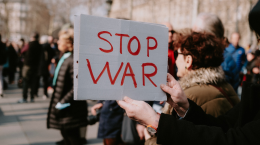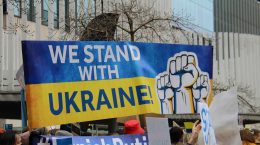Last year, we wrote about how the illegitimate state represses those who wear red and white. The persecution of people who use combinations of white and red continues, and Belarusians have become more cautious. But since February 24, this year, blue and yellow colours can’t be worn and used as well – this, according to law enforcement officials, is a picket against Lukashenko. There have already been a lot of cases of arrest of such people.
Who got arrested for blue-yellow colours and how
On February 27, in Vitebsk, during an anti-war action on the territory of the memorial complex “Three bayonets”, at least three citizens got detained. Ekaterina Bekan got arrested for laying flowers in blue and yellow colours and sentenced to 10 days of administrative arrest. Another man was detained for blue-yellow ribbons attached with white-red-white ones on his clothes.
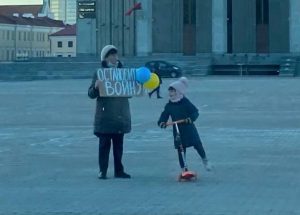 On March 1, Zhanna Trofimets got detained in Minsk, who came to Kastrychnitskaya Square with an anti-war poster and yellow and blue balloons. She got arrested even though her little granddaughter was nearby. Zhanna Trofimets got sentenced to a fine of 3040 rubles. With Zhanna Trofimets, they detained the fifth-year Belarusian National Technical University student who took photos of the woman.
On March 1, Zhanna Trofimets got detained in Minsk, who came to Kastrychnitskaya Square with an anti-war poster and yellow and blue balloons. She got arrested even though her little granddaughter was nearby. Zhanna Trofimets got sentenced to a fine of 3040 rubles. With Zhanna Trofimets, they detained the fifth-year Belarusian National Technical University student who took photos of the woman.
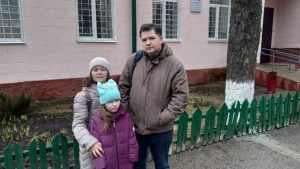 On March 4, the teacher Larysa Sekerzhytskaya got detained in Babruisk secondary school #27. The reason was the yellow and blue ribbon in her hair. The first to notice it was the math teacher, who told the school principal that the teacher had woven a ribbon in the colours of the Ukrainian flag in her hair. And the principal called the riot police. The court ruled that the teacher had put ribbons in her hair, not for beauty but to “express her social and political views in connection with the events in Ukraine”. The court found Larisa Sekerzhitskaya guilty and fined her 2,240 rubles.
On March 4, the teacher Larysa Sekerzhytskaya got detained in Babruisk secondary school #27. The reason was the yellow and blue ribbon in her hair. The first to notice it was the math teacher, who told the school principal that the teacher had woven a ribbon in the colours of the Ukrainian flag in her hair. And the principal called the riot police. The court ruled that the teacher had put ribbons in her hair, not for beauty but to “express her social and political views in connection with the events in Ukraine”. The court found Larisa Sekerzhitskaya guilty and fined her 2,240 rubles.
 On March 11, the artist Ales Tsirkunou got sentenced to administrative arrest. The man was detained in Minsk before the trial on the case of artist and political prisoner Ales Pushkin and got tried the next day. Law enforcers had claims against the artist, as he had white-red-white and yellow-and-blue ribbons on his clothes. Ales Tsirkunou spent 15 days behind bars.
On March 11, the artist Ales Tsirkunou got sentenced to administrative arrest. The man was detained in Minsk before the trial on the case of artist and political prisoner Ales Pushkin and got tried the next day. Law enforcers had claims against the artist, as he had white-red-white and yellow-and-blue ribbons on his clothes. Ales Tsirkunou spent 15 days behind bars.
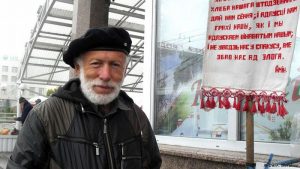 On March 15, in Vitebsk, activist Barys Khamaida got detained for refusing to take off his yellow and blue ribbon at the order of law enforcers. He explained that he wouldn’t do it because of the war in Ukraine, which resulted in the death of women and children. Boris Khamaida got sentenced to administrative arrest for 20 days.
On March 15, in Vitebsk, activist Barys Khamaida got detained for refusing to take off his yellow and blue ribbon at the order of law enforcers. He explained that he wouldn’t do it because of the war in Ukraine, which resulted in the death of women and children. Boris Khamaida got sentenced to administrative arrest for 20 days.
On March 20, Telegram channels reported the detention of five “women with umbrellas” who walked through Minsk under yellow and blue umbrellas. The published video showed law enforcement officers in uniform invading two women in an apartment. One of them was still in bed. Sisters Natalia and Galina Sinilevich, Olga Kalashnikova and Tatyana Tikhonova got detained.
On May 2, in Orsha, the owner of the local copy centre Denis Simanovich was detained. The officers of GUBOPiK came to his copy shop and drew his attention to the badges with the image of a yellow field and blue sky. At first, they let him go home but then invited him home, allegedly for a preventive talk. He informed his family that he was arrested for ten days, allegedly for picketing.
Torture of people arrested for their anti-war stance
People detained for the blue and yellow colours or for any anti-war slogans and posters are brutally tortured in prison. On February 27, more than 800 people got detained, many of whom suffered physical and mental abuse. Thus, three or four law enforcers ran up to a guy protesting near the General Staff of the Ministry of Security, threw him on the ground and started beating him with truncheons. He received 14 blows, five of which were to the head. After that, a law enforcer ran up and held the guy while he was waiting for his colleagues. As a result, several law enforcers dragged the guy by the legs and arms to the truck.
The detainee ended up in a six-person cell in the temporary detention facility where, besides him, about 20 other people were. They were even given soap and toilet paper. The young man was denied medical assistance, saying that his head hurts because he is “stupid. The trial took place on the third day, and the guy got sentenced to 10 days of arrest. He was kept in a four-person cell with 19 other people, and it was stuffy, but they didn’t allow any windows in.
After the referendum on February 27, administrative detainees got restricted in their places of detention. For example, the Zhodzina and Akrestsina temporary detention facilities in Minsk did not accept parcels from March 9 to 17. It was explained by coronavirus, and only medications were allowed.
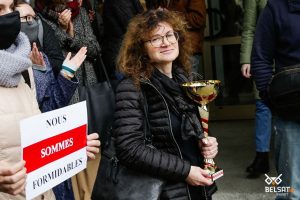 Natalia Dulina, former associate professor of the Italian language department of Minsk State Linguistic University, was also detained for 15 days after the referendum. The woman got placed in a cell with 17 people. The window could not be opened, only a window in the door, and not always. The prisoners were offered garbage instead of a sink and a hole in the floor instead of a toilet. The women had no bedding, no mattresses or pillows and had to sleep on bunks made of iron bars. Prisoners were not allowed to shower or go for walks but were regularly lice-ridden homeless people. No pads were given out – the nurse said she would take off every inmate’s panties and check who needed hygiene supplies. There was no soap or toilet paper either. Natalia told about insults and threats from the security guards. Once her cellmate complained of a headache. And then, the guard took her out of the cell and hit her head against the wall.
Natalia Dulina, former associate professor of the Italian language department of Minsk State Linguistic University, was also detained for 15 days after the referendum. The woman got placed in a cell with 17 people. The window could not be opened, only a window in the door, and not always. The prisoners were offered garbage instead of a sink and a hole in the floor instead of a toilet. The women had no bedding, no mattresses or pillows and had to sleep on bunks made of iron bars. Prisoners were not allowed to shower or go for walks but were regularly lice-ridden homeless people. No pads were given out – the nurse said she would take off every inmate’s panties and check who needed hygiene supplies. There was no soap or toilet paper either. Natalia told about insults and threats from the security guards. Once her cellmate complained of a headache. And then, the guard took her out of the cell and hit her head against the wall.
The detained man, who was serving a day in the temporary detention facility in Zhodzina, was beaten by law enforcers. They made him write a penitential video, and those who refused were beaten: one guy’s legs were blue, and he was standing up because he couldn’t lie down or sit down. There were 24 people in the cell with him. One inmate drowned the soap in the toilet, and as a result, the entire cell was left without the means of hygiene. And when the prisoners asked for toilet paper, they were given a newspaper with Svetlana Tikhanovskaya’s election speech, with her portrait on it. But the most horrible day was March 4, Police Day: Drunken guards broke into the cells, beat people, took them to the shower room and beat them.
While the world’s attention is riveted on Ukraine, which is suffering from Russian aggression, the Belarusians continue to resist, sometimes with danger to their lives. After all, a yellow sweatshirt and blue jeans, a manicure in the colours of the Ukrainian flag can be considered picketing or, worse, extremism. Belarusians stubbornly say NO to war and Lukashenko’s dictatorship, and they do not deserve to be considered enemies by the whole world.




